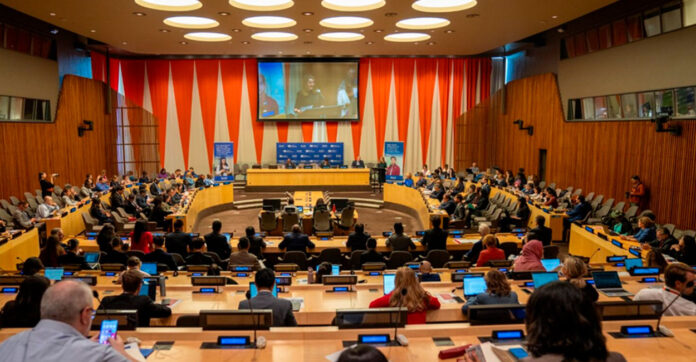
The International Organization for Migration (IOM) concluded last Wednesday its 2024 International Dialogue on Migration (IDM), centered around how to create more and better opportunities for people to move in a regular and beneficial way as part of a comprehensive approach to human mobility.
For two days, Member States, migrants, the UN system, various international organizations, civil society, youth leaders, private sector, academia, and other key stakeholders explored innovative, evidence-based policy solutions for regular pathways for migration.
“Migration has shaped our past and holds the key to our future. The evidence is overwhelming that when migration is managed well, it can drive true sustainable development around the world,” said IOM Director General Amy Pope. “By facilitating safe and regular pathways for migration, we can enable opportunities for migrants, better protect their rights, and contribute to greater prosperity in the countries migrants come from and those that host them.”
Underpinning the discussion was awareness of the critical need to leverage migration as a force for prosperity and progress for all, including the most vulnerable, in a world grappling with intersecting crises of rising conflicts, violence and disasters, all exacerbated by climate change. More and better opportunities for people to move in a regular and beneficial way were recognized as essential to unlocking migration as an opportunity for a better future.
Four avenues of action were identified as key to success. First, multilateral action and effective partnerships at all levels are paramount to mobilizing joint action to facilitate regular pathways. The private sector has a key role to play and should be systematically and meaningfully involved in these partnerships. Second, effective engagement at the local level, with communities and local level authorities, is essential to strengthen these pathways and enhance social cohesion and resilience, ensuring positive longer-term impacts of regular migration. Third, migrant and diasporas’ voices must be heard, as they have transformative potential in advocacy and development. Lastly, the role of innovation and technology was underscored in providing migrants with better access to information, resources, training, and skills recognition.
Overall, there was consensus on safe and adaptable models for regular pathways, recognition of the need for multi-layered cooperation, acknowledgment of the importance of opening up more opportunities for regular migration to reduce migration risks and vulnerabilities and strengthen its development impacts.
The IDM coincided with IOM’s announcement of its new Global Goodwill Ambassador, actress, producer and director, America Ferrera. Renowned Ghanaian musician and National Goodwill Ambassador for IOM, Kofi Kinaata, also lent his distinctive voice to promote regular migration pathways at the event.
Moving forward, IOM will spearhead efforts to create an ecosystem that brings together the various stakeholders and processes needed to facilitate pathways at scale. It will continue working with partners on regular pathways as part of its wider commitment to advance the 2030 Agenda and the Global Compact for Migration and will seek to advance this discussion in key fora, including the upcoming G7 meeting, the New Agenda for Peace, the Summit for the Future, and the second IDM occurring in Geneva later this year.






